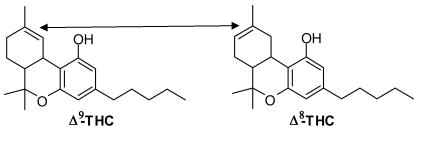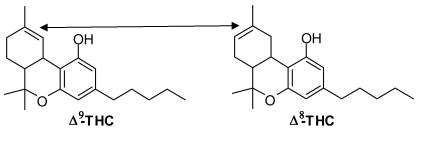What is Delta 8 THC?
While most people are familiar with THC and CBD, there are hundreds of unique terpenes and cannabinoids present in varying amounts across all strains of Cannabis Sativa L - otherwise known as the Hemp or Marijuana plant. Each cannabinoid molecule has its own range of effects on the body and mind, including many medicinal qualities. For example, CBD is a known antiemetic (effective against vomiting and nausea) yet does not share the psychoactive characteristics of its’ cousin: Delta 9 THC, which most refer to simply as ‘THC.’
As the hemp and cannabis industries boom and prohibition comes to an end, new compounds are being regularly discovered, isolated, and studied. Evidence points to a so-called ‘entourage effect,’ where the specific combination of cannabinoids and terpenes work in concert to achieve a synergy not possible on their own; making the further study of each individual compound crucial to understanding and uncovering what the cannabis plant has to offer.
Delta 8 THC is a particularly exciting cannabinoid, exploding onto the scene around 2019, Delta 8 is reported to produce many of the same benefits as Delta 9 but with a mellowed mental effect. It has also been reported to produce much fewer instances of paranoia and anxiety some may suffer from Delta 9.
The name Delta 8 THC is close to the well-known psychoactive Delta 9 THC, this is due to their molecular similarity. In fact, they are exactly the same in formula and are known as isomers. The difference occurs in a distribution of charge in the form of a double bond. This charge change causes Delta 8 THC to bind to receptors in a slightly less effective way than Delta 9 THC. In THC there is a double bond after the 9th carbon, in Delta 8 THC, the double bond is simply after the 8th.

Due to the similarity in shape of these two molecules, they are both able to fit into our bodies’ endocannabinoid receptors, like a hand into a glove. The molecules are thought to activate the same downstream pathways that result in feelings of euphoria, relaxation, and creativity. However, Delta 8 THC activates these pathways at a lower intensity, resulting in a more mellow experience than Delta 9 THC. In addition to the previously mentioned reduction in anxiety and a better ability to maintain focus than traditional Delta 9 THC.
Where does Delta 8 THC come from?
All cannabinoids present in hemp and marijuana start their lives as Cannabigerolic acid (CBGa), which then is broken down into one of three lines: THCa, CBDa, and CBCa. In most strains CBGa is immediately converted to CBDa and THCa. Thus, more THC means less CBG and CBD (or vice versa).
Different forms of Cannabis Sativa L have varying pathways to biosynthesis (the formation of complex molecules, such as THC, within a living organism) which is why some strains may contain high quantities of certain cannabinoids and very little of others. Unlike recreational marijuana, hemp has specific synthases that produce high quantities of CBD but very little Delta 9 THC.
As such, Delta 8 THC is present only in small quantities in the hemp plant. Therefore, Delta 8 THC is derived from the CBD found in hemp through a process known as isomerization. Isomerization of Delta 8 THC is a unique conversion process and is nothing new, the process has been around for decades.
First the CBD is dissolved in an acid, usually glacial acetic acid, this chemical process converts some of the CBD into Delta 9 THC, but after 72 hours over half of the original CBD is now Delta 8 THC. The material is refined and remediated to remove any unwanted substances including any remaining Delta 9, thereby maintaining the hemp-derived status of the final product.
Is Delta 8 THC legal?
Hemp has a close-knit history with the United States. As a staple crop in many colonies in the 1700’s, it was legally mandated for farmers to grow. In fact, many of the founding fathers cultivated hemp, including George Washington. Hemp has been legal for most of US history, except for between 1932-2018 due to the lack of understanding between the differences in hemp and recreational marijuana. This misunderstanding ended with the Farm Act of 2018, when hemp was legalized. As of March 22, 2021 hemp has become fully regulated by the USDA, ensuring safe production and testing of plants with less than .3% delta 9-THC by weight.
Delta 8 THC is derived from federally legal hemp in accordance with the following strict legal definition of the 2018 Farm Bill:
“The plant Cannabis Sativa L. and any part of that plant, including the seed thereof and all derivatives, extracts, cannabinoids, isomers, acids, salts, and salts of isomers, whether growing or not, with a delta-9 tetrahydrocannabinol [delta-9 THC] concentration of not more than 0.3 percent on a dry weight basis.’
Therefore, all hemp products that fall under this definition and abide by all other provisions of the law are federally legal
What is the current state of research for Delta 8 THC?
Studies have shown that Delta 8 THC reduces inflammation and pain. Other reports have indicated that both delta 8 and 9 THC create a reduction in nausea and anxiety in humans, while also increasing appetite. These positive effects are similar to those of THC but without the foggy haziness and reduction in energy. Delta 8 THC is a promising alternative for those seeking the beneficial effects of THC but with more energy and clarity.

